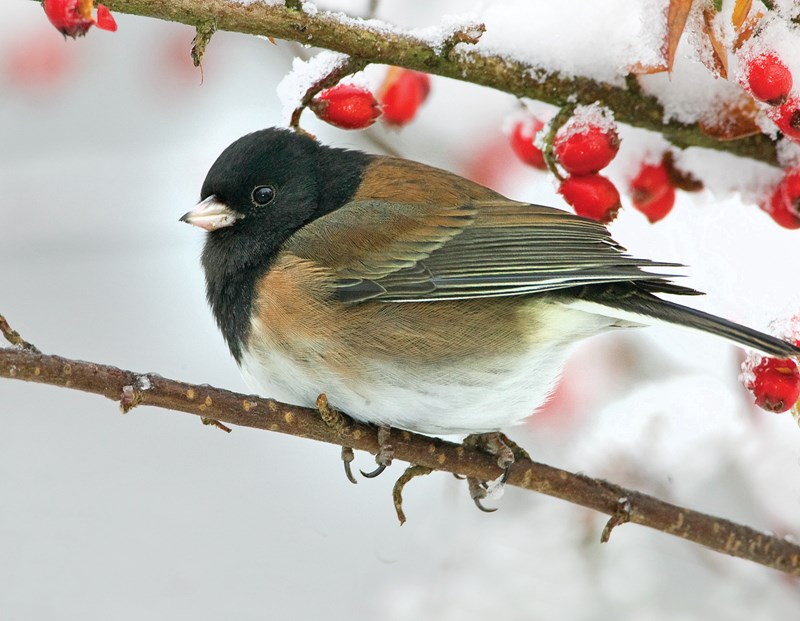Autumn is such a wonderful time to explore the outdoors on the North Shore with trees in all their glory of golds and reds, excellent birding, fabulous mushrooms and more.
Bird song is usually associated with the warmer months of spring – the breeding season. This is of course when songsters, like warblers, vireos, the western tanager and black-headed grosbeak, return from their Neotropical wintering areas.
I should also add that in addition to songs, birds have calls. Songs are typically used to establish and defend breeding territories, whereas calls serve many other purposes, such as warning of danger, or keeping in contact (like a flock of bushtits).
On a fall visit to the Conservation Area at Maplewood Flats you will be impressed at the bird music – both songs and calls. Some species, like the song sparrow and the black-capped chickadee will sing, especially if it is a sunny day. In the case of the song sparrow, it isn’t always the “polished” song of spring, but it is always beautiful and causes one to pause and listen.
And the chickadee, a “name sayer,” does its sweet “tea time” notes – or is it “cheeseburger?” The charming fox sparrow, down from its summer breeding areas (like the sub-alpine of local mountains) is usually heard making “ticking” sounds, but once in a while will fill the air with a delightful “air.” The spotted towhee, said to be a “well-dressed sparrow” (since it’s not a “little brown job” or LBJ), can frequently be heard giving its kitten-like (to me) meowing calls. In fall, we find towhees scratching around in places like blackberry thickets, but in spring, it often sits atop trees and shrubs, head tipped back, singing its fine thrilling song.
Red-winged blackbirds love to celebrate sunny mornings with their distinctive and delightful “onk-a-ree,” but they also have a chatter – like many blackbird related birds.
Feeder watchers are thrilled when a flock of 15-20 (or more) bushtits land on their suet feeders. Listen carefully for their quiet twittering calls as they keep in touch with each other, and watch out for danger from above. It is a good safety system with many keen eyes watching.
Speaking of quieter voices, don’t forget to watch and listen for kinglets as you walk the sanctuary’s trails. Sometimes they are high up in the trees, but every so often they will feed low down, even on the ground. The other kinglet to keep a watch for is the ruby-crowned kinglet. In both species it is amazing to watch when they flash colour on their crown. There is no other way to describe it.
Listen for raptors overhead or perched, like the screams of the red-tailed hawk or the chirping of the bald eagle. Speaking of eagles, you may come across a scene where you hear gulls screaming – usually it is at an eagle.
When you are walking the sanctuary’s trails listen for the scolding birds, like chickadees. Instead of their usual leisurely “chick-a-dee-dee,” there are a lot more “dee-dees.” This means they have discovered something like an owl or some other predator. Chickadees are never wrong and they are often joined by other birds, like nuthatches, creepers and kinglets.
Make sure to visit the Wild Birds Unlimited feeding station at the sanctuary. Here you will be able to get close-up views of a fine variety of birds, such as juncos and finches. Listen to for their lovely voices – close your eyes and just listen for a while.
November is full of nature’s wonders. There is so much to see and hear, from the “rattle” of a kingfisher, to the “chirp chirp” flight calls of crossbills. And yes, the Pacific chorus (tree) frog are also calling. Air smells so good on a cool fall morning. It is all wonderful and ours to enjoy.
Keep Safe.
Al Grass is a naturalist with Wild Bird Trust of British Columbia, which offers free walks at The Conservation Area at Maplewood Flats on the second Saturday of every month. The next walk will be Saturday, Nov. 12 starting at 10 a.m. Participants will look for the birds of fall. Meet at WBT’s site office, 2645 Dollarton Hwy., North Vancouver. Walks go rain or shine. wildbirdtrust.org



